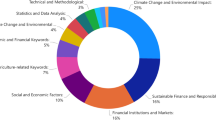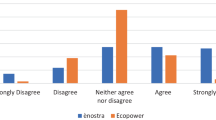Abstract
China officially opened up the power sales market in 2015, and the power sales market has gradually changed from state control to market allocation of resources. However, is it compatible with sustainable green development? Using the progressive DID MODEL, this document quantifies the impact of electricity sales reform on regional green development. It uses panel data from 30 power reform pilots in China from 2009 to 2020. The findings show that China's electricity sales reform hinders the regional green economy. It is pronounced in areas with weak local government financial strength, inadequate financial development, insufficient information infrastructure and weak property rights protection. This research has broad policy implications. It provides insights for policymakers in China and potentially other developing countries seeking to carry out electricity sales market reform. It may also provide insights into the design and implementation of such reforms to ensure they align with green development goals.

Source: Authors

Source: Authors
Similar content being viewed by others
Data availability
The data presented in this study are available on request from the corresponding.
References
Aldubyan M, Gasim A (2021) Energy price reform in Saudi Arabia: modeling the economic and environmental impacts and understanding the demand response. Energy Policy 148:111941. https://doi.org/10.1016/j.enpol.2020.111941
Andersen P, Petersen NC (1993) A procedure for ranking efficient units in data envelopment analysis. Manage Sci 39:1261–1264. https://doi.org/10.1287/mnsc.39.10.1261
Bertrand M, Duflo E, Mullainathan S (2004) How much should we trust differences-in-differences estimates? Q J Econ 119:249–275. https://doi.org/10.1162/003355304772839588
Bogdanov D, Ram M, Aghahosseini A, Gulagi A, Oyewo AS, Child M, Breyer C (2021) Low-cost renewable electricity as the key driver of the global energy transition towards sustainability. Energy 227:120467. https://doi.org/10.1016/j.energy.2021.120467
Borenstein S, Holland SP (2003) On the efficiency of competitive electricity markets with time-invariant retail prices
Chen S (2010) China’s green industrial revolution: an interpretation based on the perspective of environmental total factor productivity (1980–2008). Econ Res 45:21–34
Chen J, Huang S, Kamran HW (2023) Empowering sustainability practices through energy transition for sustainable development goal 7: the role of energy patents and natural resources among European Union economies through advanced panel. Energy Policy 176:113499. https://doi.org/10.1016/j.enpol.2023.113499
Du W, Li M (2019) Government support and innovation for new energy firms in China. Appl Econ 51:2754–2763. https://doi.org/10.1080/00036846.2018.1558356
Huang Y, Pu Y (2020) Power selling side reform, market entity changes, and electricity price dividends: based on bargaining game. J Manag Eng 34:74–82
Huang Y, Yu S, Pu Y (2023) Electricity price reform and manager behavior in power generation enterprises: based on multi-objective principal-agent model. China Manag Sci 1–13
Jacobson LS, LaLonde RJ, Sullivan DG (1993) Earnings losses of displaced workers. Am Econ Rev 685–709 https://www.jstor.org/stable/2117574
Jiatang G, Pinliang L (2016) Does the Internet promote China’s total factor productivity? Manage World 10:34–49
Lin B, Zhu R (2022) How does market-oriented reform influence the rebound effect of China’s mining industry? Economic Analysis and Policy 74:34–44. https://doi.org/10.1016/j.eap.2022.01.013
Li L, Tao F (2012) The choice of optimal environmental regulation intensity in China’s manufacturing industry: based on the perspective of green total factor productivity. China Ind Econ 05:70–82
Li QY, Zhang YSN (2021) Financial openness and resource allocation efficiency–evidence from foreign banks entering China. China Ind Econ 5:95–113
Li B, Peng X, Ouyang MK (2013) Environmental regulation, green total factor productivity and change of industrial development in China: an empirical study based on data from 36 industrial sectors. China Ind Econ 4:56–68
Li L, Zhao Z, Liu B (2021) Research on the effectiveness evaluation and optimization path of China’s power system reform in the context of “deregulation and service”—based on the analysis of 1486 household electricity enterprises’ power panel data in Chongqing. Public Adm Rev 14:140–158
Li R, Li N, Yan X (2022) The influence mechanism of power market integration on regional green economic efficiency. Resour Sci 44:523–535
Li Y, Yan C, Ren X (2023) Do uncertainties affect clean energy markets? Comparisons from a multi-frequency and multi-quantile framework. Energy Econ 121:106679. https://doi.org/10.1016/j.eneco.2023.106679
Lou X, Dou C, Wang G (2006) DEA-based evaluation of the relative effectiveness of China’s power reform performance. Contemp Finance Econ 04:90–93
Petersen MA (2008) Estimating standard errors in finance panel data sets: comparing approaches. Rev Financ Stud 22:435–480. https://doi.org/10.1093/rfs/hhn053
Puller SL, West J (2013) Efficient retail pricing in electricity and natural gas markets. Am Econ Rev 103:350–355
Pu L, Tan Z, Wang X, Wang J, Yang J, Wang H (2022) The impact of electricity price cross subsidy cancellation on China’s social economy: a comparative analysis from a regional perspective. China Soft Sci 383(11):92–101
Qingwang G, Junxue J (2005) Estimating total factor productivity in China. Econ Res J 6:51–60
Ren X, Zeng G, Dong K, Wang K (2023b) How does high-speed rail affect tourism development? The case of the Sichuan–Chongqing Economic Circle. Transp Res Part A: Policy Pract 169:103588. https://doi.org/10.1016/j.tra.2023.103588
Ren X, Zhong Y, Cheng X, Yan C, Gozgor G (2023a) Does carbon price uncertainty affect stock price crash risk? Evidence from China. Energy Econ 122:106689. https://doi.org/10.1016/j.eneco.2023.106689
Ren X, Zeng G, Zhao Y (2023c) Digital finance and corporate ESG performance: Empirical evidence from listed companies in China. Pac Basin Financ J 79:102019. https://doi.org/10.1016/j.pacfin.2023.102019
Rodon Modol J, Eaton B (2021) Digital infrastructure evolution as generative entrenchment: the formation of a core–periphery structure. J Inf Technol 36:342–364. https://doi.org/10.1177/02683962211013362
Shao C, Sultan N, Yang Q (2021) The environmental effects of foreign investment on local enterprises in host countries: evidence from China. World Econ 44(03):32–60
Shiltz DJ, Cvetković M, Annaswamy AM (2015) An integrated dynamic market mechanism for real-time markets and frequency regulation. IEEE Trans Sustain Energy 7:875–885. https://doi.org/10.1109/TSTE.2015.2498545
Shrestha B, Tiwari SR, Bajracharya SB, Keitsch MM, Rijal HB (2021) Review on the importance of gender perspective in household energy-saving behavior and energy transition for sustainability. Energies 14:7571. https://doi.org/10.3390/en14227571
Song F, Cui J, Jiang Z (2023) Efficiency improvement, rent transfer and market-oriented reform-social welfare analysis based on the reform of the electric power industry. Economics (Quarterly) 23(02):464–480
Sun C, Zhan Y, Du G (2020) Can value-added tax incentives of new energy industry increase firm’s profitability? Evidence from financial data of China’s listed companies. Energy Econ 86:104654. https://doi.org/10.1016/j.eneco.2019.104654
Sun X, Xiao S, Ren X, Xu B (2023) Time-varying impact of information and communication technology on carbon emissions. Energy Econ 118:106492. https://doi.org/10.1016/j.eneco.2022.106492
Tone K (2001) A slacks-based measure of efficiency in data envelopment analysis. Eur J Oper Res 130:498–509. https://doi.org/10.1016/S0377-2217(99)00407-5
Tone K, Tsutsui M (2010) An epsilon-based measure of efficiency in DEA—a third pole of technical efficiency. Eur J Oper Res 207:1554–1563. https://doi.org/10.1016/j.ejor.2010.07.014
Wang B, Liu GT (2015) Energy conservation and emission reduction and China’s green economic growth—based on a total factor productivity perspective. China Ind Econ 5:57–69
Wu YA, Ng AW, Yu Z, Huang J, Meng K, Dong ZY (2021) A review of evolutionary policy incentives for sustainable development of electric vehicles in China: Strategic implications. Energy Policy 148:111983. https://doi.org/10.1016/j.enpol.2020.111983
Yang S, Ma L, Wu Z, Liao J, Zhang X, Fan M (2018) The latest progress and enlightenment of Japan’s electricity sales side market liberalization. China Southern Power Grid Technol 12:56–59
Yang C, Erfeng X, Yingjing H, Dunnan L (2019) Power supply service quality evaluation of power selling companies based on TOPSIS and BPNN. J Power Syst Automat 06:113–120
Ye C (2021) Marketization reform and government regulation on the power selling side: experience and enlightenment from Texas, United States. Comp Econ Soc Syst 02:101–112
Yu Y, Liu D, Gong Y (2019) Too late is too late to make things happen: local economic growth target constraints and total factor productivity. Manage World 35(07):26–42
Zhang Y, Guo S, Shi X, Qian X, Nie R (2021) A market instrument to achieve carbon neutrality: Is China’s energy-consumption permit trading scheme effective? Appl Energy 299:117338. https://doi.org/10.1016/j.apenergy.2021.117338
Zheng S (2021) China’s power system reform and grid enterprise productivity. Ind Econ Rev 03:5–18
Zhou N, Price L, Yande D, Creyts J, Khanna N, Fridley D, Franconi E (2019) A roadmap for China to peak carbon dioxide emissions and achieve a 20% share of non-fossil fuels in primary energy by 2030. Appl Energy 239:793–819. https://doi.org/10.1016/j.apenergy.2019.01.154
Funding
This research received no external funding.
Author information
Authors and Affiliations
Contributions
Q.L. was responsible for conceptualization, methodology, formal analysis, investigation, visualization, and writing—original draft preparation; Q.L. and W.X. contributed to writing—reviewing and editing; and W.X. was involved in supervision. All authors have read and agreed to the published version of the manuscript.
Corresponding author
Ethics declarations
Conflict of interest
The authors declare no conflict of interest.
Additional information
Publisher's Note
Springer Nature remains neutral with regard to jurisdictional claims in published maps and institutional affiliations.
Rights and permissions
Springer Nature or its licensor (e.g. a society or other partner) holds exclusive rights to this article under a publishing agreement with the author(s) or other rightsholder(s); author self-archiving of the accepted manuscript version of this article is solely governed by the terms of such publishing agreement and applicable law.
About this article
Cite this article
Li, Q., Xi, W. Sustainable and market-oriented solutions for the electricity sales market reform. Econ Change Restruct 57, 30 (2024). https://doi.org/10.1007/s10644-024-09608-x
Received:
Accepted:
Published:
DOI: https://doi.org/10.1007/s10644-024-09608-x




